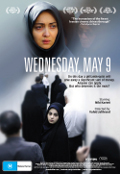
Directed by
Vahid Jalilvand
102 minutes
Rated PG
Reviewed by
Bernard Hemingway

Wednesday, May 9
Synopsis: Two women answer an newspaper ad offering to give away a significant sum of money to someone in need.
One of the beauties of film is that it takes us places which in the ordinary run of events are inaccessible to us. Such is the case with Vahid Jalilvand’s debut feature film, which takes us into the lives of ordinary people living in modern-day Tehran.
Divided into three intertwined stories the film opens on Leila (Niki Karimi, an established Iranian film star) as she hurries anxiously to a residential street in Tehran’s well-to-do north for reasons which we do not yet know She has to leave there for her menial factory job (taking her young daughter with her) but returns later that night. There she encounters Jalal (played by Jalilvand) the man who has placed an ad in the newspaper offering to give away 30 millian tomans (the price of a used car) to someone in need. It turns out that Jalal s someone from her past. She explains that she needs the money because her husband is a invalid who needs an operation. Jalal agrees to give her the money and asks her to return the next day.
We then jump to the story of Setareh (newcomer Sahar Ahmadpour) a young orphaned woman who lives with her aunt and older male cousin. It is revealed that she has committed the sin of marrying a man without their consent and when her cousin finds out a fight breaks out and her husband ends up in jail. The only way he can get out is to pay her cousin 30 million tomans in “blood money”. She finds out about Jalal’s ad and goes to join the crowd of supplicants.
The third story is that of Jalal who has never got over the loss of his 5-year-old son many years earlier and believes that his relatively modest act of charity would appease his suffering.
There is a certain imbalance to the film with Setareh’s situation, albeit remarkable from a Western perspective, not having the same emotional impact as Leila’s crushing circumstances. This may have been intentional as ultimately both episodes are determined by the morality of fundamentalist Muslim patriarchy producing an outcome which is more than a little ironic.
Although these stories are each profoundly sad it is the empathy so typical of Iranian cinema that makes the film persuasive viewing. Much as we see in the clamouring throng that waits outside Jalal’s office there is a strong sense that Leila and Setareh’s stories are representative of a society worn into joylessness thanks to the antediluvian prejudices of its reigning ideology.

Want more about this film?


Want something different?




